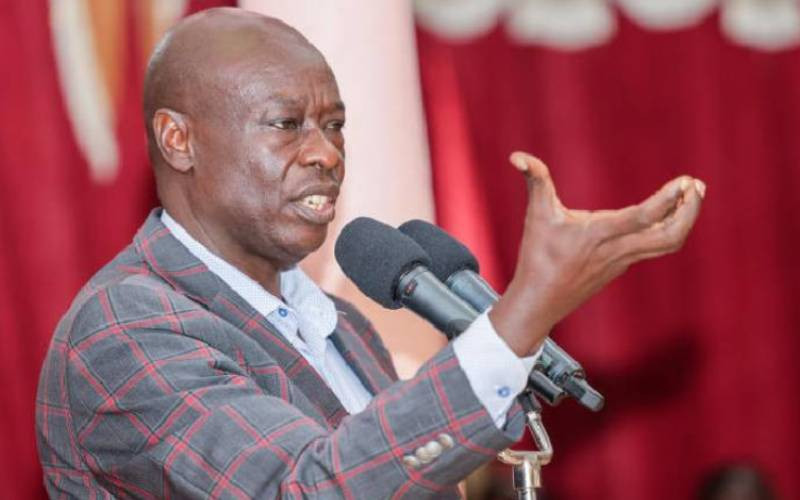The declaration was signed by representatives of 14 Palestinian factions, including Mahmoud al-Aloul, vice chairman of the central committee of Fatah, and Moussa Abu Marzouk, a senior member of Hamas. Wang said that ambassadors from Egypt, Russia and Algeria also attended the meetings.
Wang restated China’s support for a “comprehensive, lasing and sustainable cease-fire” and for the convening of a large “international peace conference” to work toward a two-state solution.
A key to the debate over how to end the grueling nine months of fighting in the Gaza Strip is how the enclave will be governed afterward, whether through continued Israeli occupation or some form of Palestinian control — though the Israeli government has rejected any proposal featuring Hamas or the Fatah-controlled Palestinian Authority.
The statement calls for the formation of a Palestinian unity government overseeing the West Bank, Jerusalem and the Gaza Strip and eventually holding elections, for which the leaders of the factions will meet and draw up a road map.
The joint statement may be a clear diplomatic win for Beijing, but analysts were immediately skeptical about the prospects for this agreement, noting that it is only the latest in a long series of similar reconciliation deals brokered — then broken — between the two factions since the power struggle that ended in 2007 with Hamas taking control of the Gaza Strip from Fatah officials.
GET CAUGHT UP
Stories to keep you informed
An earlier attempt by Beijing to broker talks between Hamas and Fatah in April concluded without a joint statement.
Palestinian political experts generally dismissed the agreement as a rehash of several previous statements of reconciliation, including a 2022 accord signed by 14 Palestinian factions in Algeria. To date, none of those efforts have produced any lasting changes in the Hamas-Fatah rift.
The Chinese initiative comes at a time of peak tensions between the two factions, particularly since Palestinian Authority President Mahmoud Abbas recently blamed Hamas for prolonging the Gaza war. Hamas leaders in turn accused Abbas of siding with Israel.
Immediately after the Chinese announcement, Palestinian participants began expressing doubt in background comments to Arabic language media. A participant told the Saudi outlet Al-Sharq that the “stormy” meeting produced no breakthroughs, just a statement that was silent on specific measures and the areas of sharp disagreement.
“Fundamental differences emerged between the two movements regarding ending the division, relating to authority, law, the possession of legitimate weapons, and methods of struggle,” the participant said.
Diana Buttu, a Palestinian human rights lawyer and onetime adviser to Abbas, said the skepticism was deserved, but that there were also reasons to hope conditions for a rapprochement were improving. The grinding crisis in Gaza and recent judicial rulings against Israel in international courts are reasons for all sides to come together, something reflected in the Chinese statement.
The risk now, Buttu said, was that the 88-year-old Abbas will sideline the reconciliation efforts as he has done in the past, either under pressure from Israel and the United States to marginalize Hamas or from his own desire to stay in power.
“The reason he hasn’t agreed to this in the past is because he’s afraid he’ll be cast aside,” Buttu said. “The question is whether within his own faction there will be forces stronger than the forces that want to kill it.”
Gazans said the diplomacy was a universe away from the devastation and deprivation of their lives for the last nine months.
“Come here to Earth and look at the hospitals in which there is not a single drop of blood that can save people’s lives,” Kary Thabit, 40, who has been displaced 10 times in the war and called the factions “a joke.”
“Look at the people in the northern Gaza Strip who are dying of hunger,” she told The Washington Post by phone. “Look at how Israeli tanks are frolicking in the land of Gaza. These people do not represent me. They are just failed actors.”
In Israel, Foreign Minister Israel Katz dismissed the agreement as just Palestinian leader Abbas embracing “the murderers and rapists” of Hamas and said it will come to nothing. “Hamas’s rule will be crushed, and Abbas will be watching Gaza from afar. Israel’s security will remain solely in Israel’s hands,” he said.
After decades of preferring to leave contentious diplomacy in the Middle East to the United States, China has in recent years actively cast itself as a viable peacemaker in some of the world’s most intractable hot spots.
“China’s Middle East policy is obviously different from that of the West,” said Tang Zhichao, an analyst at the Chinese Academy of Social Sciences. “There is an urgent need to reverse a lack of mediation by the international community,” brought about in part by the Western world’s geopolitical marginalization of the Palestinian issue, Tang said.
The final statement was peppered with language thanking China for its mediation and the need for more countries to be involved in resolving the Middle East crisis. “This should be done under the auspices of the United Nations with broad international and regional participation, as an alternative to unilateral and biased American sponsorship.”
Beijing brokered a détente last year between Iran and Saudi Arabia, forcing Washington into the awkward position of applauding a major Middle East accord secured by its main geopolitical rival.
“The Middle East is not the territory of any one major power,” the Global Times, a nationalist state-run tabloid, said in an editorial published Monday. By adopting a “unique diplomatic mediation model,” Beijing has fostered a “wave of reconciliation” in the region, it said.
China has also tried to present itself as a broker in the Russia-Ukraine war, promoting a 12-point proposal for ending it.
Ukrainian Foreign Minister Dmytro Kuleba will arrive in Beijing on Tuesday for talks with his Chinese counterpart, in which he hopes to enlist Chinese support to put an end to Russian aggression.
Here’s what else to know:
The World Health Organization on Tuesday said there was a high risk of the infectious polio virus spreading in and beyond the Gaza Strip citing the devastating sanitation condition, according to Reuters. WHO and UNICEF teams will arrive in Gaza Thursday to collect human stool samples, Ayadil Saparbekov, the team lead for health emergencies at WHO in Gaza and the West Bank said, after vaccine-derived polio virus type 2 was detected in sewage samples from Gaza.
The average daily water supply in Gaza currently is only about a quarter of prewar levels, according to the United Nations Office for the Coordination of Humanitarian Affairs. Between July 8 and 21, Gaza received 90,000 cubic meters of water, the agency said Monday, adding that damage to infrastructure and fuel shortages had hampered water supplies and purification.
On Monday, German ambassador to Israel, Steffen Seibert, condemned a weekend attack by extremist settlers on international activists and Palestinian farmers in the town of Qusra in occupied West Bank and called for prosecution. “International and Israeli activists, including a German citizen, were attacked by extremist settlers in the West Bank while they were peacefully helping Palestinians in their olive groves,” Seibert wrote on X, alongside a video purportedly showing the attack. Two Americans and one German activist were treated in hospital for suspected fractures, according to the International Solidarity Movement.
The Israel Defense Forces killed Ashraf Nafa, the top Hamas commander in Tulkarm in the West Bank, the IDF said Tuesday. Nafa was responsible for manufacturing and embedding explosives targeting soldiers and recruiting operatives, it added. Hamas on Telegram confirmed the killing of Nafa and two others in the attack.
President Biden will meet Israeli Prime Minister Benjamin Netanyahu in Washington on Thursday, according to a U.S. official who spoke on the condition of anonymity under ground rules set by the White House.
At least 39,090 people have been killed and 90,147 injured in Gaza since the war started, said the Gaza Health Ministry, which does not distinguish between civilians and combatants but says the majority of the dead are women and children. Israel estimates that about 1,200 people were killed in Hamas’s Oct. 7 attack, including more than 300 soldiers, and it says 326 soldiers have been killed since the start of its military operations in Gaza.
Hajar Harb, Hazem Balousha, Suzan Haidamous, Vic Chiang and Kate Brady contributed to this report.




















Discussion about this post